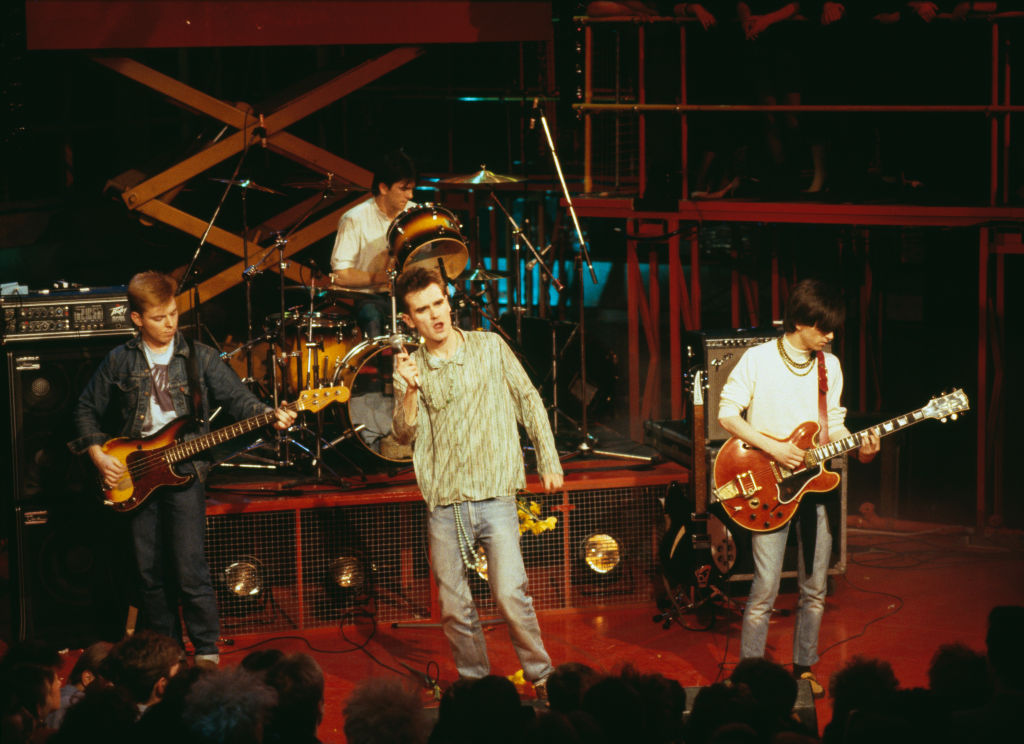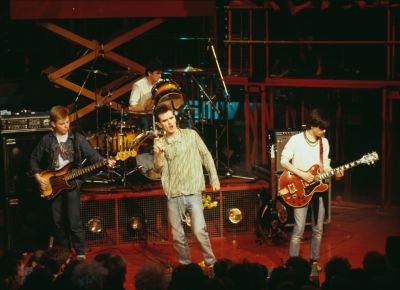The Smiths are one of those rare bands that managed to build a remarkable, enduring legacy and sustain an ardent fan base despite having very little success on the singles charts. Since its debut album in 1983 and long after its break-up less than four years later, the Manchester-based guitar-pop band—comprising singer and lyricist Morrissey, guitarist and songwriter Johnny Marr, bassist Andy Rourke, and drummer Mike Joyce—has enjoyed critical acclaim and a cult following. In the early 2000s, Rolling Stone included four Smiths albums on its list of the 500 greatest in rock history. Their music has functioned as plot points in at least two films produced long after the group’s disbanding: (500) Days of Summer and The Killer.
Yet although the band’s LPs did very well in the United Kingdom, that success did not carry over onto its home country’s singles chart. The Smiths had only two top-10 singles while they were together, landing a third with a post-breakup re-release in 1992. They never even broke the Top 40 in the United States.
What accounts for this strange greatness, this simultaneous influence and invisibility? One way to understand the status of The Smiths is by considering their first top-10 U.K. single, “Heaven Knows I’m Miserable Now,” released 40 years ago this week. (If you don’t know the song, or just want to bask in its excellence again, check it out here.)
The song was born in New York City on January 2, 1984. The legendary record executive Seymour Stein had promised Marr weeks before that if the band signed with his label, he’d buy him a guitar in New York City. Deal! So when the band was in New York for its first American tour (which lasted only one date—they canceled when Joyce got the chicken pox), Stein bought him a red 1959 Gibson 355. The first riff Marr played on it would become the intro to “Heaven Knows.” The band recorded the finished song in London that March and released it on May 13.
It’s easy to imagine the average BBC Radio 1 listener—or American college student—hearing the song for the first time and wondering, What the hell is this? Other bands featured guitars with the Byrds-like jangle in their opening riffs, but Marr makes liberal use of his whammy bar to provide a tremolo that sounds straight out of the surf-rock classic “Walk Don’t Run” by The Ventures. After Marr’s intro, Morrissey enters to croon his list of laments:
I was happy in the haze of a drunken hour
But heaven knows I'm miserable now.
I was looking for a job, and then I found a job,
And heaven knows I'm miserable now.
Not your typical pop verse. It’s littered with complaints about a hangover and employment (a bit of a humblebrag, given the 11.9 percent unemployment rate at the time); no rhymes, only the repetition of the phrase that doubles as the song title and sounds like dialogue from a Victorian novel. That isn’t surprising. Morrissey adored Oscar Wilde and cribbed a line from George Eliot’s Middlemarch for lyrics to “How Soon Is Now?”. In this case, though, Morrissey was also tweaking the title of a 1969 song called “Heaven Knows I’m Missing Him Now,” which had been a hit for the British singer Sandie Shaw (whom Morrissey adored, and who released a version of a Smiths song that spring).
The melody alters slightly for the slant-rhymed chorus—“In my life / Why do I give valuable time / To people who don't care if I live or die?”—Morrissey holding the note for every long “ī” and breaking into a falsetto for the last three syllables. (The following year, the Minneapolis rockers The Replacements elaborated on this sentiment in “Bastards of Young”: “The ones who love us best / are the ones we’ll lay to rest / And visit their graves on holidays at best. / The ones who love us least / are the ones we’ll die to please.”)
The song’s structure is remarkably simple without being monotonous. When Morrissey begins the second verse, Marr and producer John Porter add a track of delicate, arpeggiated chords, heavy on the reverb and delay, to deepen the texture. You’ve heard of Phil Spector’s Wall of Sound? This is Johnny Marr’s Bead Curtain of Jangle. And while Morrissey repeats the title phrase four times over two verses, the third verse omits it and offers one of the funniest sexual encounters in pop:
What she asked of me at the end of the day
Caligula would have blushed.
‘You’ve been in the house too long,’ she said
And I naturally fled.
These four short lines encompass all that men ever imagine—the Roman empire and sex—while distinguishing Morrissey as one of the pop-era’s few frontmen to run from the latter.
Morrissey then varies the chorus for its third iteration, raising the stakes by wondering why he smiles “At people who I'd much rather kick in the eye.” These and other lines from the song capture something important about The Smiths that the band’s detractors tend to miss: Morrissey’s moping isn’t always self-indulgent—sometimes it’s very funny. And even when it’s not, the contrast between the lyrics and Marr’s upbeat guitar can still make the songs joyful.
There’s another, seldom-recognized quality that makes this and many other Smiths songs magical: the bass playing of Andy Rourke, who passed away last May. As characteristically memorable as Marr’s opening riff is, Rourke’s bassline makes the intro bounce by offering a subdued but solid counterpoint to the delicate tone. Over the verses and choruses, Rourke’s bass ascends or descends, speeds or slows as necessary to complement the frenzy of Marr’s guitars.
The song was included on the U.K. compilation Hatful of Hollow in late 1984; American fans who wanted it on LP either had to shell out extra bucks for the import or wait until 1987, when it was included on the compilation Louder Than Bombs. That’s where I first encountered the song on cassette in the early 1990s: the last track on Side A, nestled amid a run of great songs, like “William It Was Really Nothing” and “Ask,” that let me ignore the >>FF>> button.
Critics tend to rank “Heaven Knows” among the band’s best songs. Rolling Stone and MoJo both list it at No. 8, Paste at No. 2. (The usually reliable NME relegates it to No. 16.) It even made the Rock & Roll Hall of Fame’s list of 500 Songs that Shaped Rock. That last honor is both remarkable and odd, because no other band really sounds like The Smiths.
But there’s no doubt they were trying to shape popular music. Shortly after writing “Heaven Knows,” Marr said that in the years since the advent of punk, “Too many people . . . [have] just wrecked the beauty of music, which is what The Smiths want to bring back.” Their first top-10 single showed how that was possible.






Please note that we at The Dispatch hold ourselves, our work, and our commenters to a higher standard than other places on the internet. We welcome comments that foster genuine debate or discussion—including comments critical of us or our work—but responses that include ad hominem attacks on fellow Dispatch members or are intended to stoke fear and anger may be moderated.
With your membership, you only have the ability to comment on The Morning Dispatch articles. Consider upgrading to join the conversation everywhere.